By Peter Weis @PeterVicey
The latest edition of “Tactics Talk” takes an especially close look at some of the interesting tactical workings of Borussia Dortmund. There are also draw-ups for Bremen, Freiburg, Wolfsburg, Stuttgart, Gladbach, Leverkusen, and Bayern.
Another fantastic round of Bundesliga matches beckons, so do come along for all the analysis, scrutiny, and even a celebration of the best footballing linguistic phrases turned by the German press!
Bundesliga Tactical Banter: Round 19
Notes from the Commercial Capital
Highlights were scarce in a Friday evening “curtain raiser” many of us maintained much higher hopes for. The RheinMainAdler hardly soared in their drab 1-0 victory over Mainz. Touching scenes prior to kickoff gave us the most noteworthy talking point of this match. Eintracht’s colorful President Peter Fischer bade farewell to the beloved club he’s served so passionately for so many years. Non-Bundesliga followers may recall Fischer as the gravely-voiced goofball who once remarked that winning the Pokal with Frankfurt in 2018 felt better than the “best champagne and best sex” combined.
Fischer took a microphone to the FanKurve to said goodbye in typical, precious, and eccentric “Peter Fischer Fashion”. Wonderfully satisfying stuff. After that, it’s rumored that we had a “football match”. Those who budgeted time to focus on this stinker can neither confirm nor deny these rumors. What took place straddled the line of what can safely be defined as an actual “football match”. Even Eintracht’s more promising recent performers didn’t seem present. German football’s diminutive hero Mario Götze at least supplied us with a memorable goal. Götze doesn’t score with his head often.
Tactically speaking, SGE trainer Dino Toppmölller kept his previous XI in place. Some minor maneuvering (Donny van de Beek played alongside Sasa Kalajdzic in a 4-4-2 for a time) barely merits a mention as it failed to produce any results. Jan Siewert’s Mainz almost seem deliberately set up to be boring. A 3-5-2 spread constellation keeps risks at a minimum. Disciplined defending and top-notch goal-tending from very much in-form keeper Robin Zentner prevent this team from conceding too many goals. Fair enough. No one up front scores many, however. Siewert asks and receives little.
Notes from the Pre-Zero
The running joke in German footballing circles still holds that “Heidenheim-Hoffenheim” counts as the least interesting top flight pairing to grace the league in years. As if to intentionally deliver an “f**k you” to German footballing purists, these two teams supplied us with a five-goal thriller in the “Hin-runde”. A pair of towns carrying a reputation for being ignorable and nondescript lit it up in possibly one of the greatest league fixtures hardly any Germans ever saw. And this time? Meh. This time they lived up to their reputation. A 1-1 draw in Sinsheim. As per usual, one strains to find interesting points to raise.
Pellegrino Matarazzo’s Kraichgauer unquestionably deserved all three points. The hosting Badeners bested their fellow BaWü club by an xG ratio approaching 3:1. Heidenheim keeper Kevin Müller kept out a barrage of chances from the TSG shortly after the re-start. The Hoffenheim attacking duo of Wout Weghorst and Maximilian Beier somehow missed out on the scoresheet thanks to Müller’s heroics. Florian Grillitsch – sensibly moved up into midfield in a 4-4-2 diamond – got his fair share of looks in as well. The author, having lambasted Matarazzo a lot recently, should show some respect.
TSG’s American trainer rubbished his latest set of garbage tactics. John Anthony Brooks and Kevin Akpoguma came on to stabilize a new back-four. Duh. Such a no-brainer this was. Why did it take Matarazzo so long to come to his senses whilst watching his team allow in 21 goals over the last ten games? Oh well. Better late than never one supposes. The new 4-4-2 exhibits potential as it sensibly moves Grillitsch, Anton Stach, and Grischa Prömel forward. The squad finally features a natural left back in the newly-acquired David Jurasek. If Matarazzo can simply stick to a simple order, he’ll earn praise again.
Notes from the Köpenick Quarter
Despite the fact that relegation-threatened 1. FC Union Berlin gained a massive three points with a narrow 1-0 victory over visiting SV Darmstadt 98 in the Sunday early kickoff, there isn’t terribly much to glean from the third match in our “skim section”. Entertainment value (predictably enough) remained low throughout. Virtually no one expected something akin to the fireworks we witnessed in the reverse fixture. Unions crawl away from the relegation pack looks to keep proceeding slowly amid an extended touchline ban for their trainer and transfer collapses rendering life difficult for the front office.
Benedikt Hollerbach’s continued rise (three league goals in the last three league games) makes for an uplifting story. The summer signing from the 3. Liga scored what proven to be the match-winner in the third consecutive match in which he’s registered a tally. Eventually, however, the player who reminds German football watchers of Luca Waldschmidt in both build and style-of-play should taper off. That in itself won’t prove fatal as FCU managing director Oliver Ruhnert solid transfer window (on both the defensive and offensive end of the roster) give this team what it needs to climb up the table.
Union woke up considerably after Hollerbach’s opening goal. Wingbacks Christopher Trimmel and Robin Gosens began to play with the sort of confidence we’ve not seen from them since just before the great “Eisernen Collapse” commenced. Buttressing attacker Andras Schäfer – appearing increasingly fit – also came on strong late. Even total transfer flop Brenden Aaronson performed well off the bench. Plenty of upticks on display in the capital city’s Köpenick quarter. A lot to look forward to here, not least six more pressers with charismatic FCU interim trainer Marie-Louise Eta. All is well here.
The “Spiegel Specials”: Round 19
Dortmund-Bochum (1:1, 3:1)
In perhaps the most significant result of the round, Edin Terzic’s Schwarzgelben shook off the stain of two successive 1-1 draws against their Ruhrpott rivals (one last spring and one this autumn) to ultimately take care of business at precisely the right time. Plaudits are definitely in order for a number of reasons. Terzic’s BVB waded through a mini-injury crisis calmly and cooly. Die Schwarzgelben mustered up the appropriate response when a Nico Schlotterbeck own-goal threatened to freeze this fixture in another 1-1 stalemate. Dortmund looked a legit top-four-side during a fierce final 20 minutes.
The victory that places Terzic’s crew back in the top-four – as alluded to in some earlier coverage – featured no fewer than three major tactical shifts. The BVB trainer and his two new assistant coaches clearly put a great deal of thought into their match-day preparations these days. No shortage of yellow to be spilled on the pages this week as getting us caught up with the state of Dortmund even requires some more back-tracking. The columnist missed a crucial BVB tactical tweak in the last edition of the column. As soon as news of a 3-2-2-3 began cropping up in the papers, a fresh look was essential.
A strong opening hand
It’s honestly not an exaggeration to state that Terzic and company made all the right moves in this latest win. Youssoufa Moukoko took the place of the injured Brandt in what was the lone change to the previous outfield. Salih Özcan and Marcel Sabitzer worked a clear split-stagger in midfield. The “slingshot effect” produced several promising attack charges in the opening seven minutes. Pressure applied enabled the hosting Westphalians to earn an early penalty when VfL keeper Manuel Riemann took out Donyell Malen in the box. Niclas Füllkrug duly converted the 1-0.
Lineup—Dortmund—Match 19 (4-4-2)
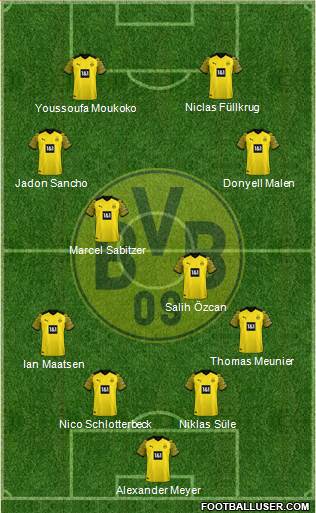
Not unlike in the reverse fixture, Dortmund encountered some problems containing their courageous neighbors on the break. Own-goal-scorer Schlotterbeck – along with defensive colleagues Thomas Meunier and Niklas Süle – had their fair share of difficulties defending the slender lead. That doesn’t change the fact that the Black-and-Yellows remained by far the more compelling side in attack. Dutch dynamo Ian Maatsen’s fine form run rolls on. The new left-back proves more than capable of carrying the line defensively whilst also supplying some offensive sizzle of his own.
Maatsen (from open play) and Marcel Sabitzer (off a dead ball) generated the two best chances Dortmund had of doubling their advantage before the break. After Schlotterbeck unluckily straddled in a cross from one of this column’s favorite Bochum actors (Patrick Osterhage) Malen and Jadon Sancho just missed out on restoring the play with a beautiful sequence seconds before it came time to head into the locker rooms. Which team played better during the opening 45 wasn’t up for debate. One held the belief that the better team would ultimately come out on top.
Terzic’s first adjustment
The BVB trainer’s response to the legginess that ensured after the restart also counted as spot-on. The 1848ers began exploiting the space rendered available by Terzic’s opening constellation more effectively. Osterhage and VfL winger Christopher Antwi-Adjei forced saves of back-up keeper Alexander Meyer in the opening ten minutes. Maatsen, Moukoko, and Özcan started committing errors. Introducing Giovanni Reyna for Moukoko in the 66th enabled Terzic to shore up his midfield and spread markers out against Bochum’s tight counter-centric 4-2-3-1.
Lineup—Dortmund—67th minute (4-3-3)
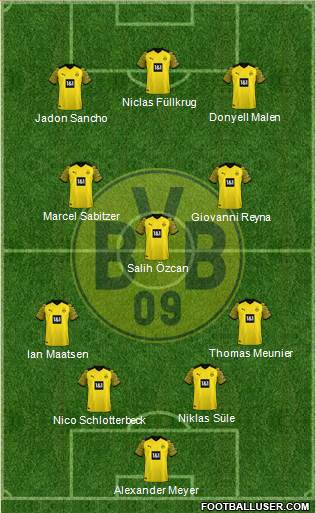
Almost immediately, Dortmund’s play exhibited a more structured and faster feel. Füllkrug completed his scorer’s brace just seconds after – with the team safely solidified in this shape – Jamie Bynoe-Gittens entered for Malen on a straight-arrow-swap. Bynoe-Gittens picked out Sabitzer, who int turn serviced Füllkrug with an inviting cross. The 2-1 scoreline sufficiently scrambled the VfL ranks to the point that Thomas Letsch’s men could no longer play above their level. Substitutes Gonçalo Paciencia, Moritz Broni-Kwarteng, and new acquisition Gerrit Holtmann lent the squad some potential….
Terzic’s second adjustment
….but the BVB coaching team team had things sewn up just three minutes after Letsch’s 80th minute triple substitution. Mats Hummels relieved Sancho. A 5-4-1 re-format crystalized without delay. Kwarteng punched through the third constellation once. Apart from that, nothing penetrated a textbook tactical case of closing out a match properly. The general idea of using Hummels as a horizontally chained sweeper happens to be a damn good one. It might be the case that we see something like this again:
Lineup—Dortmund—84th minute (5-4-1)
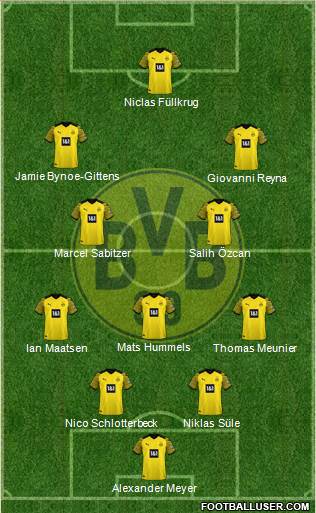
Such a formation even dovetails nicely with the intriguing look at the unique bit of tactical intrigue promised at the beginning of this section. Closer inspection of last week’s win yielded some genuine excitement about the possibilities of sliding Maatsen into a six-role slightly reminiscent of the manner in which Terzic utilized Raphaël Guerreiro late last season. Sancho and Malen can serve as de-facto strikers alongside Füllkrug in a tightly clustered top-axis. This frees up Brandt to roam around in his trademark style while Sabitzer lurks as a distance threat.
Ahem.
An important question:
Does Terzic have an “ace card”?
He does.
Here it is.
Lineup—Dortmund—Observed (3-2-2-3)
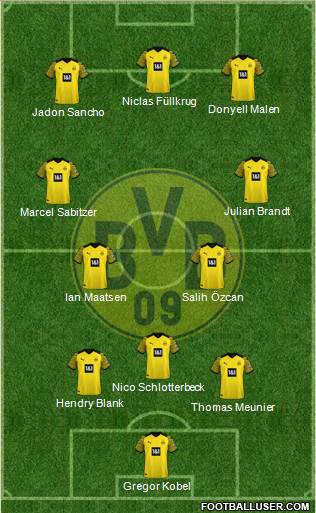
The most glaring potential weakness (namely the amount of space between the top two axes) doesn’t really constitute a weakness if Maatsen can keep up is strong work against the ball. Özcan also demonstrates sufficient maturity as a defender. The back-three displayed above would obviously function better with better personnel. That’s where the returning Hummels, squad captain Emré Can, or even natural left-back Ramy Bensebaini (as he’s done with the Algerian national team at AFCON) come in. All three can function as stay-at-home central defenders.
Prognosis: The Third Terzic Comeback
We’ve prognosticated this so many times in these pages. Little stands in the way of it coming to pass. Even BVB boss Acki Watzke (known for almost never smiling) cackled and grinned through questions about his locally-sourced trainer in a recent interview with Germany’s main sporting tabloid. While admitting that football always remains a results-driven business, Watzke didn’t directly retract an earlier statement about sticking with Terzic for “the next few years”. Dortmund stumbled upon this gem while waiting for Marco Rose to arrive in 2021. Few Germans even recall something from Rose’s season.
Terzic, after last year, should soon have a third major comeback under his belt. Six to nine points from the next three fixtures (Heidenheim, Freiburg, and Wolfsburg) can help this team cement their place in the top-four ahead of the Champions’ League return. One might as well point out that the team exceeded all expectations in that competition earlier this season. The BVB trainer possesses plenty of weapons. Much more importantly, he and his assistants noticeably work out decent ideas every week. The title race probably remains out-of-sight, but this was a rebuilding year anyway.
Bremen-Freiburg (0:1, 3:1)
A fairly significant result in the top flight’s north Hanseatic City State saw Bremen, to the surprise of many of us, successfully parlay their momentum from last weekend’s upset win over Bayern and flip the script on Freiburg. Monday’s “Süddeutsche Zeitung” described the two successive wins (and a new investor deal for the club) the “Perfekte Werder Woche”. Bremen’s impressive dismantling of what we thought to be a very good side counted as a big surprise; doubly so when the released team-sheets revealed that SV talisman Mitchell Weiser had to withdraw because of injury.
Werder trainer Ole Werner clearly wasn’t expected for Weiser to be absent from his game-plan. The 3-5-2 utilized last week stayed in place. Felix Agu moved over to the right to take over Weiser’s spot while Olivier Deman started on the left. One can’t exactly say that this worked. After Freiburg’s Jordy Makengo gifted the Hanseatic hosts a chance to grab the lead early from the penalty spot, Deman actually screwed up and allowed the Breisgauer to equalize via a penalty of their own. In many respects, Freiburg were the better team in the opening half.
Newly installed SV #1 net-minder Michael Zetterer turned in his second exceptionally strong match in-a-row. SCF attackers Vincenzo Grifo and Lucas Höler both had chances to put Christian Streich’s men in front. A tactical re-adjustment from Werner (without changing personnel) at the half, enabled the hosts to operate with some more pop. As he’s often done this season, Werner entered the match with a 3-4-3 back-up plan in his back-pocket. The team (to the columnist’s eyes at least) sometimes operated in this shape going forward in the first 45.
Lineup—Bremen—46th minute (3-4-3)
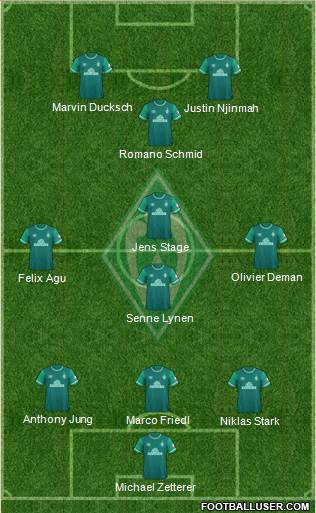
The versatile Jens Stage seems to excel with three clear passing-lane options ahead of him. The improving Senne Lynen also seems to improve still more whenever an arrangement like this shrinks his zonal assignment. Although it’s a highly subjective opinion belonging exclusively to this columnist, any sort of plan that throws Romano Schmid forward central counts as an excellent idea. Schmid and the much-lauded Justin Njinmah both supplied some brilliance on Njinmah’s 2-1 in the 53rd. Of course, Freiburg contributed some truly terrible unsorted stuff on what would prove the match-winner.
Streich’s crew also messed up royally on Julian Malatini’s 3-1 at 90+3. We all suddenly received some understanding of why new SCF signing Atilla Szalai never made it off the bench at Hoffenheim when the Hungarian committed an error so bad it counted as a capital crime on the third goal. Before going into Freiburg’s problems in greater depth, one should say that Njinmah did impress on some other chances that didn’t turn into tallies. Stage and Schmid were equally impressive. Great work from the back-three and keeper Zetterer again. This wasn’t merely a case of Freiburg tripping themselves up.
Did Freiburg trip themselves up?
The final sentence of the above paragraph having been written, one needs to stress that all the youngsters in the SCF lineup (without a single exception) all had awful days at the office. Streich compensated the loss of Manuel Guide to suspension by starting natural fullback Kiliann Sildillia in central defense. Last week’s hero Roland Sallai had to pass with illness. Noah Weißhaupt thus took over on the right; a side on which the German U21 international has significantly less experience. Streich’s previous 4-4-2 became a 4-2-3-1.
Lineup—SC Freiburg—Match 19 (4-2-3-1)
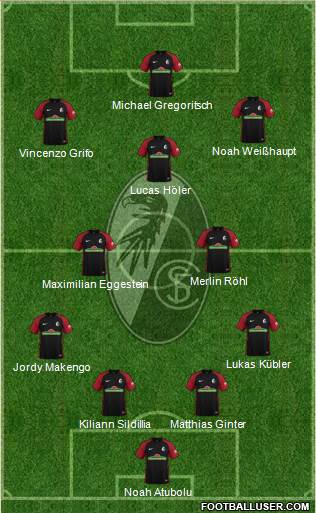
Not much positive to report on at all. Makengo conceded the penalty. Sildillia struggled throughout. Kübler made numerous errors. Former SV academy man Maximilian Eggestein and Merlin Röhl barely factored in at all. Rookie keeper Noah Atubolu simply can’t seem to get it together on this level. The poor 21-year-old keeps pulling winces out of those of us who truly wanted him to succeed this year. Atubolu nearly suffered the ultimate net-minder shame of getting caught off his line in this one. Streich should have pulled the plug on this much sooner.
Lineup—SC Freiburg—72nd minute (4-4-2)
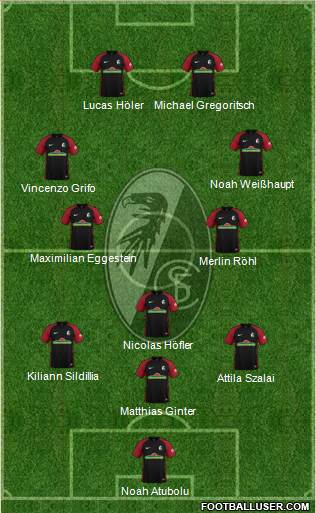
When the SCF trainer did finally try something different with his double substitution (Szalai and Nicolas Höfler for Kübler and Makengo in the 72nd) matters quickly progressed from bad to worse. The author isn’t even entirely sure this was supposed to be the late-match idea. There might very well not have been one. For all the deserved respect Streich accrues, the Bundesrepublik’s “cult trainer” enjoys his fair share of “off-days”. A pity he suffered such one against a beatable opponent.
Prognosis: Freiburg’s rebuilding year
Injuries to Daniel Kofi-Kyereh, Kenneth Schmidt, Philipp Lienhart, and Maximilian Philipp haven’t helped. This team’s European prospects already suffered an enormous blow when squad captain Christian Günter went down with an inflamed forearm fracture early in the season. Though Günter nears a comeback, it remains to be seen if the eight-times-capped German international will even manage to look like the same player for a while. A very tough stretch of matches – Stuttgart, Dortmund, Lens (UEL), Eintracht, Lens (UEL again), and Augsburg – beckon.
The significance of this defeat hits hard. We may look back upon this loss as the moment when, insofar as the table is concerned, Freiburg lost sight of Europe. The old adage of “Freiburg Hin-runde overachieving” may be in for one of those years in which a cliché proves correct. So much points to this team quietly dropping off the radar over the next few weeks; stuck in seventh place while the real “Europe hunters” open up an insurmountable points gap. Some good news exists in that Freiburg aren’t facing any real pressure from below in the table. They can “rebuild” and “retool” in peace.
The “Burning Question”: Round 19
How bad are two bad teams?
Köln and Wolfsburg happen to be so bleeding bad that it hurts the columnist to even contemplate beginning this discussion thread. Köln’s 1-1 draw with Wolfsburg competes with some of this year’s goalless draws as one of the worst top-tier matches of the season. Here’s a genuinely painful “burning question” for everyone: When do writers truly discover that their reservoir of ideas has run dry? After watching Köln-Wolfsburg. Yikes. No amount of long walks, power naps, and trips to the bakery for Schoko-Croissants can help one figure out something to lead with here.
We went into Köln in greater depth last week, so it’s best to skim over them here. Frankfurt loanee Faride Alidou offered up die Geißböcke some hope with his very first Bundesliga goal and just the 12th league tally for the entire team this season. The goal nevertheless came from a Joakim Maehle deflection off a free-kick. The Hamburg-native’s play was otherwise quite patchy. Köln’s back-line did okay, but there aren’t any other positives to report upon. Head-coach Timo Schulz’s use of Jan Thielmann as a lead striker conjures up bad memories of Markus Gisdol and Ondrej Duda.
Regarding Wolfsburg, the same story keeps repeating itself every week. Some in-form actors such as Vaclav Cerny and Lovro Majer usually help the VWers get off to an energetic start. Then they invariably fade and flatten out. Lead-striker Jonas Wind finds himself in terrible form. No six pairing in the midfield – whether captain Maximilian Arnold is included or not – can pull the strings with any consistency. Kovac’s attempts to bring some stability to this team has manifested positives such as a reliable amount of sprints and dribbles in every match.
The team still lacks creativity.
Lineup—Wolfsburg—Match 19 (4-2-3-1)
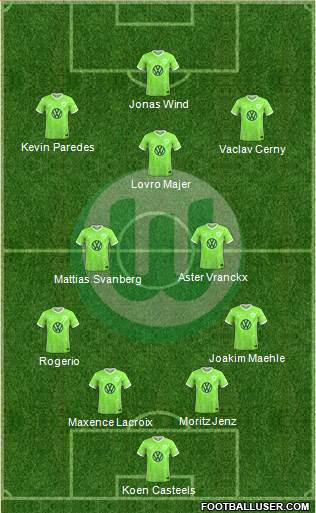
Maehle rebounded from his early mishap to provide the assist of Kevin Paredes’ equalizer. Matthias Svanberg and Aster Vranckx (admittedly filling in for ill players Arnold and Yannick Gerhardt on short notice) then muffled their possession game until the game got totally bogged down in the midfield. Some quality tinkering from Kovac a little later on managed to squeeze a little bit of blood out of this stone. Kovac fairly took Cerny and Majer off after they couldn’t match their early vigor. Ridle Baku and Tiago Tomas entered on their behalf in the 71st.
Lineup—Wolfsburg—72nd minute (4-2-3-1)
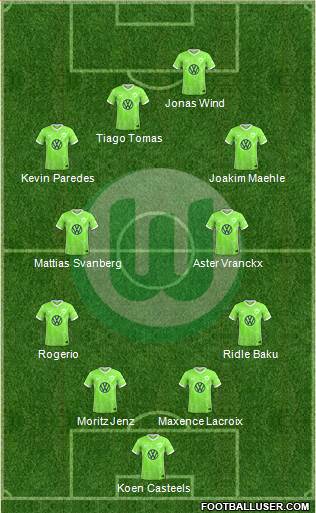
The wider spaced midfield helped both Paredes and Maehle locate some more space. The former got a decent effort off near the end. Were it not for a fine save from Köln keeper Marvin Schwäbe, the Lower Saxons might have grabbed all three points. Kudos to the young American Paredes for actually delivering a solid performance from the starting XI for the first time. Using Tiago Tomas as a service striker for Wind counted as a good idea. Unfortunately, it produced absolutely nothing. One has a sinking feeling that the Kevin Behrens signing won’t produce much either.
How long will Kovac keep his job?
A tricky query. In principle, a poor result against Hoffenheim this weekend should just about do it. The VfL management cannot abide the fact that a roster sporting CEO Marcel Schäfer spent upwards of €70 million on improving this summer continues to punch so far below its weight. On the other hand, the field of potential candidates to replace Kovac at this juncture may simply be too thin. Where can Schäfer and Schindzielorz turn? Who on earth wants this job? It begins to look as if it’s already too late to catch this team up in the table points-wise. Nine points separate them from the second UEL place.
The next head-coach must head into the gig knowing full well that success in the current season remains extremely, if not impossible, to attain. The roster remains poorly balanced. The players don’t seem to care enough to try out more playful combos and interplays beyond the first ten minutes. The rest of the European contender pack both runs away and has their way with this crew. The columnist honestly can’t see them recruiting anyone other than a Florian Kohfeldt type; someone deliberately committed to ugly grind house football until the squad can stabilize.
Ugh.
Mercifully, we’re done here.
“Weekly Wortschatz”: Round 19
“Schlüßelanhänger”
We’ll get things kicked off this week with a nice little double set of umlauts. Of all the German words those of us native speakers secretly harbor a small amount of snarkiness listening to non-natives attempting to pronounce, “Schlüßel” (“key”) may be our favorite. “Tschüß” (“ciao” or “cheers”) counts as a close second. Two tough tasks await in less than a second. Anyone trying to pronounce these words must first fight their way through a harsh combination of consonants before immediately tackling the task of re-configuring their tongue to aim for the “ü”.
Imagine having to slay a dragon, then proceed to climb a mountain. Once such a visual is embedded in your brain, picture trying to do both in the blink-of-an-eye. Not easy stuff. Even native English speakers of a certain heritage can go their entire lives without fully conquering the dreaded “consonant train wreck” associated with certain words. Case in point: The minority of Englanders who never learned how to enunciate the word “schedule” properly. Everyone recall the first time one tried to make plans with someone from the Isle who asked to check their “Shesh-she-ool”?
English speakers can be relied on to make a serious hash of certain German words. Usually the islanders – who incidentally refer to the “#” (“pound sign”) on the phone as “hash” – are the worst offenders. Englanders, other British Islanders, and Americans alike nevertheless all mess up “Schlüßel” and “Tschüß” in splendid glory. They basically give up with “Tschüß”, to the point that it comes out as “cheers” despite the fact that they are actually trying to say the German word. “Schlüßel” comes out as something incomprehensible entirely. They might as well be trying for Esperanto.
Within these introductory paragraphs, there are many potential segues into the topic of Stuttgart. We can ask if Stuttgart have located the “keys to success”, perhaps ruminate on the fact that Sebastian Hoeneß Swabians have gotten their tongue around some new words, or maybe point out that this year’s surprise sensation have fought their way through the toughest “consonantal train wreck/umlaut mountain climbing” portion of their season and are now in for a much smoother ride. All quality points on which we can pivot to the football. Plenty of choices here.
Perhaps we’ll start by divining what was intended when Germany’s Kicker Magazine described Stuttgart’s victory as a “Schlüßelanhänger” in the Monday print edition. When the author was growing up, a “Schlüßelanhänger” generally meant a kitschy “keychain” that you would buy on holiday at a gift shop in Switzerland for the elderly aunt you never found time to get around and visit. In the modern context, “Schlüßenanhänger” takes on a modern meaning. The word now translates to “key fob”; a modern instrument though which one gains access to one’s hotel room, apartment, or car.
Madly Interesting how “modern melding” has now merged these two very different meanings. A password “keychain” on the computer serves as a virtual “key fob”. Both words connote access. No more thinking back to the “keychain” that you did buy, but never got around to giving to your elderly aunt before she sadly passed away. Leaving such unpleasantness behind is for the best. Kicker wished to convey some positive news. Stuttgart – after fumbling around for a bit – re-located their keys and re-gained access to the comforts of their own brand of football.
How did they “unlock” their potential?
Lineup—Stuttgart—Match 19 (3-4-3)
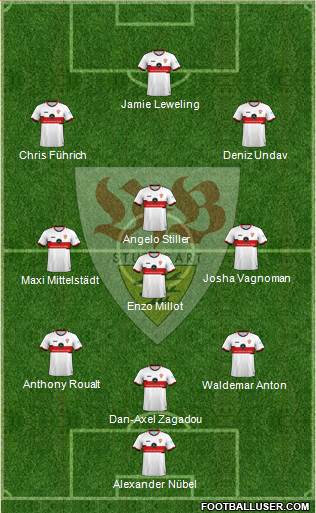
Allow the writer a chance to play devil’s advocate to his own Stuttgart optimism and talk about the problems first. Marco Rose’s “RB System” 4-4-2 caused the Swabians loads of problems with their aggressive press in the opening ten minutes. As much as one respects Sebastian Hoeneß’ targeted little tactical tweaks, his team didn’t really create any scoring chances until midway before the first half. The handball penalty that enabled Enzo Millot to take the lead from the spot in the 25th counted as very soft. Five minutes later, Deniz Undav got some serious help from David Raum on his 2-0.
Waldmar Anton and Dan-Axel Zagadou both blew their markings badly on the corner that allowed Leipzig to pull a goal back in the 32nd. Before Jamie Leweling scored the crucial 3-1 that effectively thew the lid on this match in the 48th, Hoeneß’ newly selected lead-striker missed a couple of sitters near the end of the first-half. Josha Vagnoman and Maximilian Mitterlstädt needed more quality on their finishes on a pair of chances as well. When the goals kept raining down in the second half, this affair ceased to be a tactical affair at all. Slugfest stuff in a weird (yet awesome) encounter.
The deserved praise
Thankfully, there is plenty of this to go around. Chris Führich – ahead of his new contract extension – broke out of mini-slump to play like a demonically possessed beast on the left. What an amazing performance from him; the best we’ve seen all season. Führich suddenly woke up to exceed the form that saw him earn that German national team call-up back in October. It’s actually criminal that he only registered one solitary assist on the scoresheet. Hoeneß protégée Angelo Stiller continues to impress from that advanced central midfield role. He’s fabulous on set-pieces as well.
More “Enzo Millot Magic” in this one. All of Germany couldn’t possibly be happier for the quite likable character that is Undav following his first Bundesliga hat-trick. Strong days from Mittelstädt and Vagnoman – combined with some truly impressive midfield ball wins from Anthony Roualt – leave one confident that the Zagadou injury won’t de-rail this squad. A well-tooled and in-form back-four falls directly into Hoeneß’ lap. Alexander Nübel continues to run a fine short-passing game out of the back. So much to like here.
“Fabulous February”
It gets much easier for the Württembergers after upcoming matches against Freiburg (league) and Leverkusen (Pokal). Mainz, Darmstadt, and Köln round out the month. Entirely conceivable that these southern “Autostädter” can cruise down the upcoming Autobahn and maintain their place in the top three even before their AFC and AFCON actors return. The form of both Serhou Guirassy and (more importantly) Silas at the Africa Cup of Nations suggest they’ll be getting some confident attackers back as well. Woo-Yeong Jeong – after his incredible year for country – can start producing for club.
The importance of this monumental result cannot be understated. Stuttgart threw us all for a loop here by unexpectedly besting a purportedly superior side set to reclaim what we assumed was their rightful place in the top-three. Die Schwaben said “nein!” Good on them. The doors have been flung wide open. Stuttgart fans of all stripes may celebrate the famous “red strip”. Supporters the world over may butcher the word “Schlüßelanhänger” any which way they so desire. The word spreads on this time. Even that above-mentioned deceased aunt knows the score. This team lives!
“weglächeln”
Something a tad easier for everyone in the middle portion of this section. At least, this is one that should be easy for translators not fully submerged in the soppy swamp that is the German soul. Bayer 04 Leverkusen trainer Xabi Alonso – when conducting his post-match interviews following Saturday night’s goalless draw with Gladbach – brushed off talk of how the result enabled rivals Bayern to gain ground in the title race. All the ridiculous statistics racked up by Xabi’s dominant team counted for naught as Bayer only picked up one point during a week in which Bayern picked up six.
Xabi emphasized that he would take the result in stride. The Spanish head-coach – in a phrase clear enough to most of us native English speakers – said that he would “lass alles weglächeln” (“laugh it all off”). The trouble here is that “weglächeln” isn’t technically a German word. It doesn’t occupy a space in German dictionaries. Surprised? Probably not. It makes perfect sense that Germans don’t do such things. No sense in shaking off bad days when the real solution to such dips remains intense self-hate and brooding over things that one can neither change nor do anything about.
Of course, the writer should point out that he’s actually being facetious. The real reason “weglächeln” isn’t in German dictionaries relates to the fact that non-Germans confuse the verb “lächeln” (“to smile”) with the verb “lachen” (“to laugh”). Even in English, one doesn’t “smile something off” or “smile something away”. All the same, there is no commonly used German phrase to “laugh something off”. One can “abtun” (“discount”) or “abbürst” (“brush off”) something with laughter or indeed anything else, but no pre-conjoined phrase exists. The writer’s actually only being half-facetious.
It comes time to ask ourselves whether or not Leverkusen’s slip up against Gladbach was a “laughing matter”. Is Xabi being too sanguine? Does he have real problems? The oft-repeated stats constantly broached with regard to this match (i.e. 947 passes, 28 shots on goal, 70 touches with the ball in the opponent’s third, etc) can’t help but make one laugh. More pressing superiority from die Werkself was hardly possible. BMG trainer Gerardo Seoane lined his side up in an intelligent shape well designed to soak up the B04 pressure. One of his better 4-4-2s played with disciplined commitment:
Lineup—Gladbach—Match 19 (4-4-2)
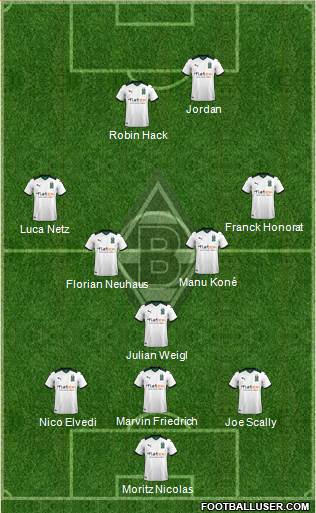
Command performance from just about everyone working deep. The Julian Weigl bolt-locked back-four continually frustrated the heavy favorites by keeping their shape and always intervening in the right moments. Virtually no Gladbach action on the counter this time, but that’s understandable in light of the fact that both Rocco Reitz and Alassane Plea were missing due to injury. Luca Netz, Florian Neuhaus, and Franck Honorat had no outlet whenever a promising ball win left them with a chance to transition. When Reitz came on in the 70th, one at least saw how it was supposed to work.
Xabi’s team ran into some poor luck and a red-hot keeper in Moritz Nicolas. Florian Wirtz, Alejandro Grimaldo, and Jeremie Frimpong missed a few chances they would have absolutely converted on better days. Leverkusen’s spectacular two late comebacks in the first two games back from the winter break left one with the feeling that their luck had to run out at some point. In terms of tactics, Xabi also didn’t wish to reach for one of his better late re-formats with so many important fixtures coming up. Though what the B04 trainer tried here is open to interpretation, it did look like he tried something:
Lineup—Leverkusen—69th minute (3-3-2-2)
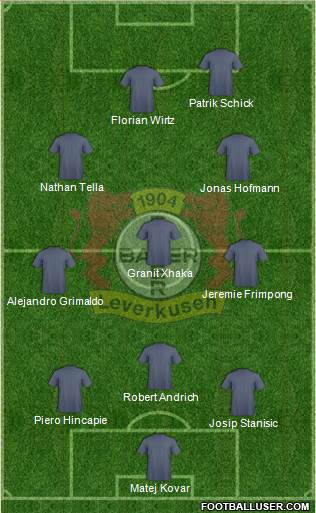
Nathan Tella’s introduction for Nadiem Amiri in the 68th didn’t necessarily herald a drastic change in the usual league 3-4-3. Moreover, the columnist admits that what seemed to be occurring on the pitch amounted to nothing more than pure improv. Granit Xhaka appeared to take over a pivot on his own solo access. Tella mostly worked in front of him. As Xabi’s best player – and arguably the most talented midfielder in the whole Bundesliga at the point – Xhaka presumably can work wherever the hell he wants to later in matches. The Swiss midfield maestro can do his own thing.
Whatever the plan late-on in the 0-0 draw happened to be, it functioned just fine. Xabi surely has better tricks up his sleeve for the more significant games. About the only thing standing in the way of a big win against Darmstadt this coming weekend is the likelihood that Xabi will withhold some of his better ideas and fall on the wrong side of Lady Luck. He might – as he did with Jonathan Tah two weeks ago – also withhold Xhaka for fear that his talisman will incur an accumulated yellow suspension ahead of the Bayern game. That could spell trouble.
Basically, laughing this one off seems a justified response. Xabi may have inadvertently (as this writer has even done in the past) inadvertently mixed up the German word for “laugh” and “smile”. No worries. One thing the Werkself gaffer got spot-on in his post-match comments was that nerviness and panic simply had no place in his mind. Alonso pointed out that permitting nerves to permeate at this point in the season would render him “stir crazy by April”. Well put. Plenty of football left to be played.
“Wagenburg”
Hell, yeah! It gets really German with this one! Nothing like picking up the Monday morning “Süddeutsche Zeitung” whenever record champions FC Bayern München find themselves in shaky form. In this particular case, the headline in a more high-brow publication helped one get rid of the unpleasant aftertaste of the Bayern coverage in the Sunday morning tabloids. Germany’s “Sport Bild” tried to ramp up the sensationalism after Saturday’s narrow 3-2 win over Augsburg. Anything to fan the flames of rumors that FCB trainer Thomas Tuchel has lost the dressing room.
A huge layout in the Sunday morning “Bild” conveyed the “shocking news” that Tuchel yelled at some of his players during Saturday’s game. With some noticeable acerbic bite, Tuchel compelled his XI to exhibit more energy, drive, courage, and passion. Duh. What? This is “news”? Excuse all of us. Forgive the columnist if he begins to sound “old fashioned”, but when exactly did professional athletics turn into “every kid gets a trophy night” at the community center? Thomas Müller (not to mention the recently retired Max Kruse) have this one right. At some point, football went way too soft.
In any event, the “Süddeutsche” did a much better job. Referencing the fact that a raft of injuries left Bayern in a very tight spot, one of the Bundesrepublik trotted out the “Wagenburg” analogy. This phrase “to circle the wagons” dates back to Roman times. When legions of the Great Empire found themselves at a numerical disadvantage against a foe that (usually unexpectedly) attacked them, the armies of the Empire tactically formed a defensive shell with whatever carriages they had in their caravan. The analogy fits perfectly with Tuchel’s tactics against Augsburg last weekend.
Something this translator always found interesting is that Americans usually don’t understand the “circle the wagons” metaphor despite the fact that it also contains roots in their country. Western pioneer caravans also deployed the tactic when ambushed by native Americans; or so it was described in all the Karl May “Cowboys and Indians” novels that Germans grew up reading. Perhaps the reason Americans aren’t familiar with it relates to the fact that it never really actually happened much. The great German novelist Karl May never set foot in America. He pulled those scenes out of his own head.
Let’s watch Bayern “circle the wagons”!
Lineup—Bayern—Match 13 (4-2-3-1)
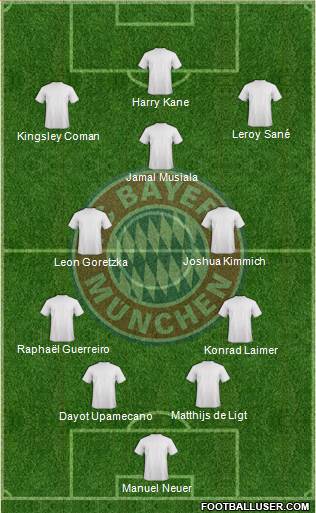
We’ll pick up with the 1-0 victory over 1. FC Union Berlin last Wednesday; a match most will only recall for the second “slapping incident” involving Leroy Sané in less than a single calendar year. Tuchel’s proclaimed “Alphonso Davies” replacement Raphaël Guerreiro scored the game-winning goal in the 1-0 win. The defending champs found themselves somewhat unlucky not to score more after playing a vastly superior second half. Eric Dier – on for the injured Dayot Upamecano at the restart – dazzled in his debut. Harry Kane saw an excellent tally disallowed.
Tuchel nevertheless needed to don his “wise-man Winnetou” headdress ahead of the Augsburg fixture once outs for Upamecano, Joshua Kimmich, and Konrad Laimer were confirmed. Davies returned to the XI out of necessity. Guerreiro took a novel turn on the right. Young riser Aleksandr Pavlovic – whom some of us consider an upgrade to Kimmich at this point – finally got another well-deserved chance in midfield. Tuchel subtly tweaked his 4-2-3-1 to turn it more of a 4-3-3 with Jamal Musiala dropping deeper.
Lineup—Bayern—Match 19 (4-3-3)
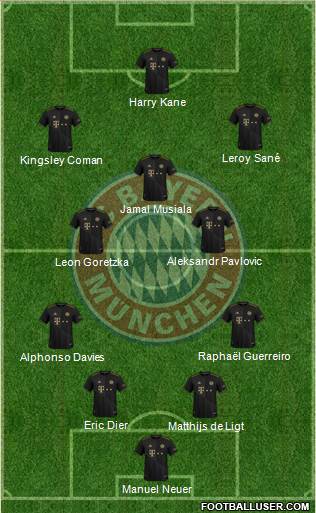
All things considered, results were largely good. Goretzka and Pavlovic clicked well in midfield. Dier and the rest of the line worked a serviceable offside trap that frequently stoped the Fuggerstädter in their tracks. The manner in which Dier and Matthijs de Ligt worked together counted as doubly impressive given how much Davies and Guerreiro poured forward. Davies shook off his form demons and registered a goal. Guerreiro looked like a natural on the right. This footballing chronicler never saw the Portuguese international work that side before. Watching him do it live served as a real treat.
Additional “wagon circling”
Kingsley Coman’s early injury meant more adjustments from Tuchel. In this case, however, the FCB gaffer didn’t really have to think up something special. Young French striker Mathys Tel has been kicking some serious tail as a sub on the left in recent weeks. The manner in which Tel seized upon this opportunity makes one wonder if the Bavarians even need to spend more cash on another winger so soon. The 18-year-old again looked strong in this ad-hoc assignment, though he and Davies accorded FCA right-back Kevin Mbabu way too much space at times.
Following Tel’s introduction in the 26th, Tuchel employed no further subs until the 89th minute. One can certainly make the case that the German giants should have put this game to bed far earlier. A team with as many midfield problems as Augsburg (Niklas Dorsch remains out and Eintracht loanee Kristijan Jakic proved an absolute disaster in his debut) granted the FCB one serious soft underbelly to exploit. Tuchel’s troops weren’t ruthless and lethal enough. Their passing also remained sloppy. An attendee to the match can confirm that Goretzka’s talk of a poor pitch was absolute garbage.
München’s “old shatterhands”
Two penalties conceded near the end of the match – by two German footballing legends taking heat in the German press for some time now – render it problematic to let Bayern escape this particular result with only light criticism. A lot of the points raised in the above subsection amount to peanuts. When Manuel Neuer and Thomas Müller start handing out chances for beaten teams to equalize from the spot, however, the topic of this team’s “generational shift” comes up. Is it time for a younger and more dynamic set of players to contest the title-race?
For better or worse, the answer appears to be yes. Factoids such as the reality that this team has never lost with Pavlovic on the pitch, maintain a significantly better record when Musiala starts over Müller in the ten slot, and that Tel records more touches and efforts than any other FCB substitute point one in this direction. The grip on absolute league sovereignty loosens. Such an eventuality was always in the cards. A “Wagenburg” in defense of the title shall make for a fun watch. Tuchel must nevertheless take risks with some of the faster, yet less steady, wagons.
Thanks so much for reading! You can catch the release of all Peter’s columns (and occasionally catch him goofing off) on whatever the hell they’re calling twitter these days @PeterVicey.
Twitter DMs are open for football conversations, corrections, and (if you truly insist) general abuse. Full color re-posts of the columns are eventually archived on Peter’s website.
Source From: Bulinews.com
Source link
- Sonic Review – The World #1 App Allows You To Launch Your Own AI Streaming Platform Preloaded With Over 100 Million Artists, Playlists, Podcasts, Genres, Audiobooks & Radio Channel And Tap Into 600 Million Paid Members!
- Voixr Review – The #1 Emotional-Based-Human-Like Voice Cloning AI Powered App Cloning and Speaking In 1,800+ Voices With 144 Native Languages Instantly Without Recording or Any Tech Skills!
- SiteRobot AI Review – The #1 AI-Powered App Let Us Build Complete Websites + Contents Instantly By Using Just Your Keyword!
- Quillaio Review – Get Your Website Ranking In Page 1 With The Most Powerful AI Engine And Hand Free Optimization Of Your Contents!
- MailDaddy Review – The New Email Marketing Software Helps You Send Unlimited Emails To Unlimited Subscribers By Getting 99.96% Inbox Delivery With Assurance To Get More Opens, Clicks, And Sales!




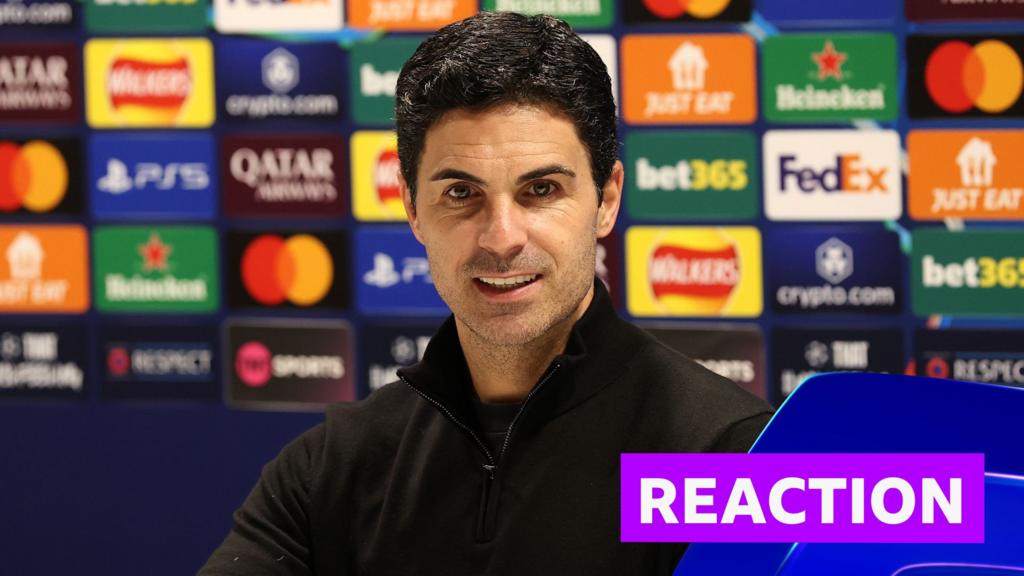
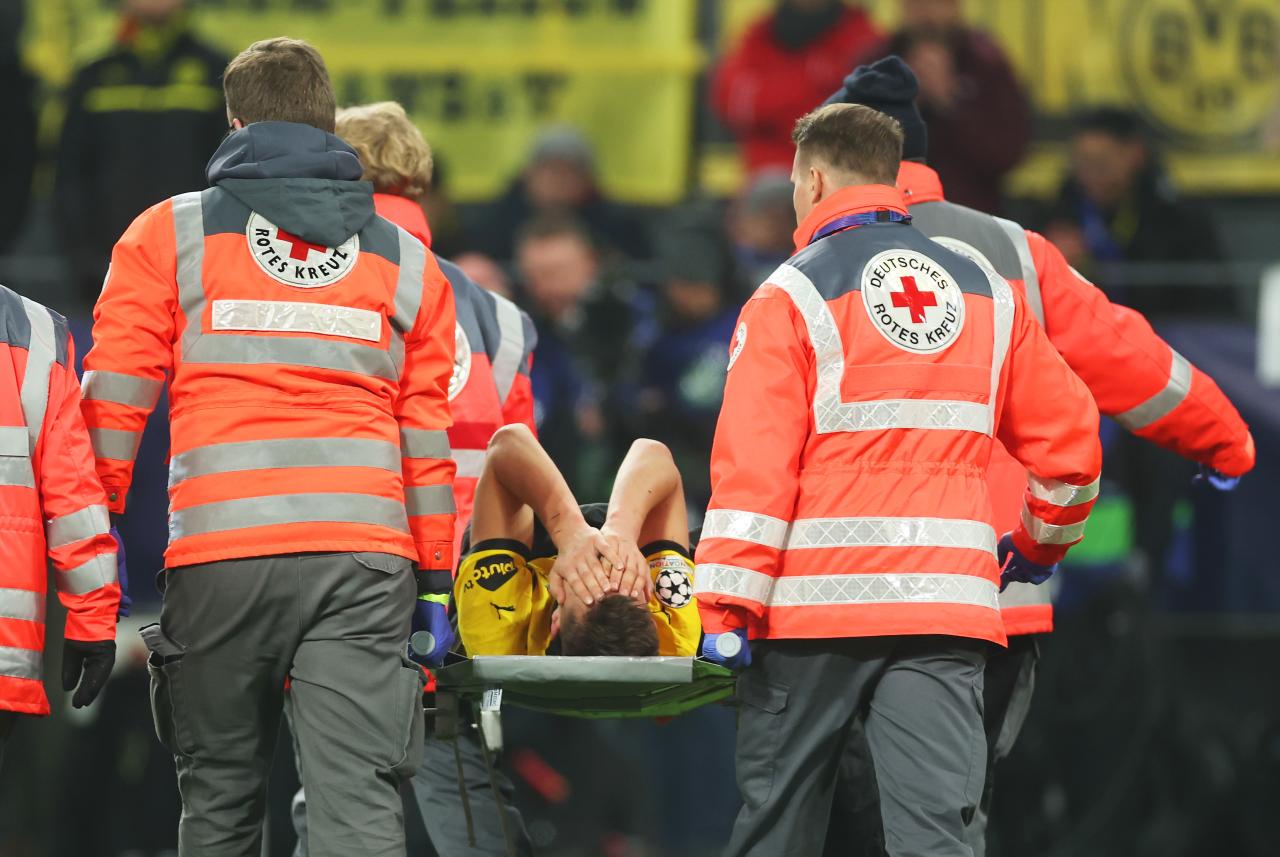
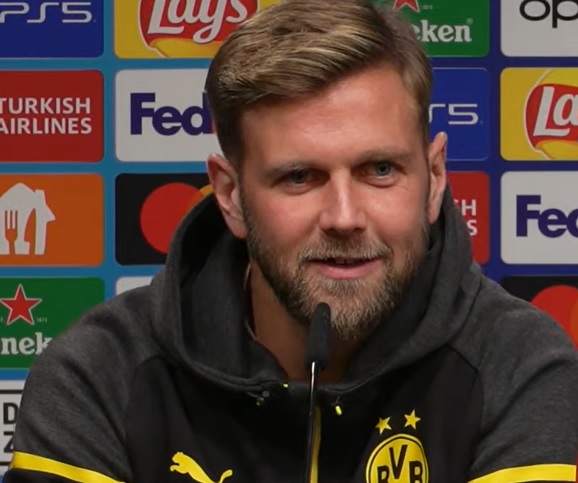

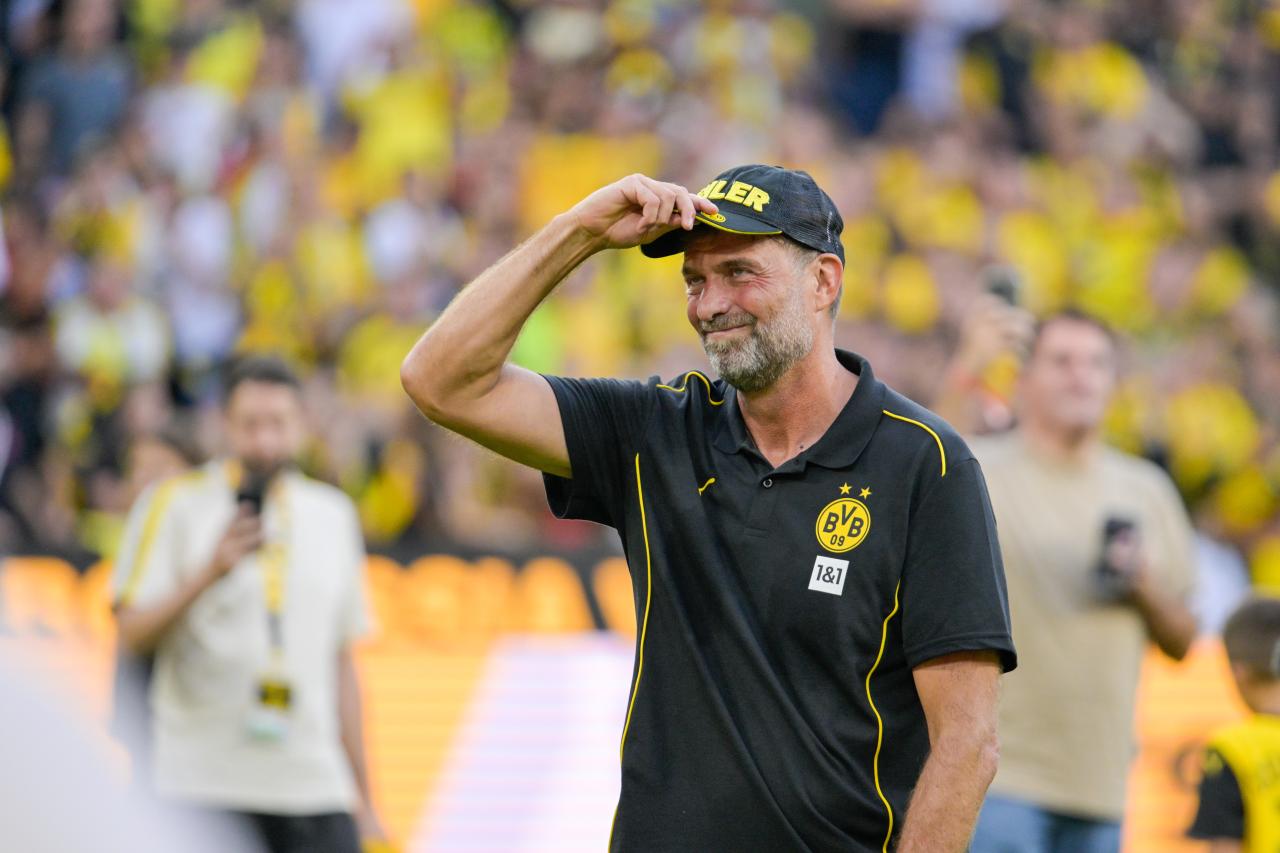
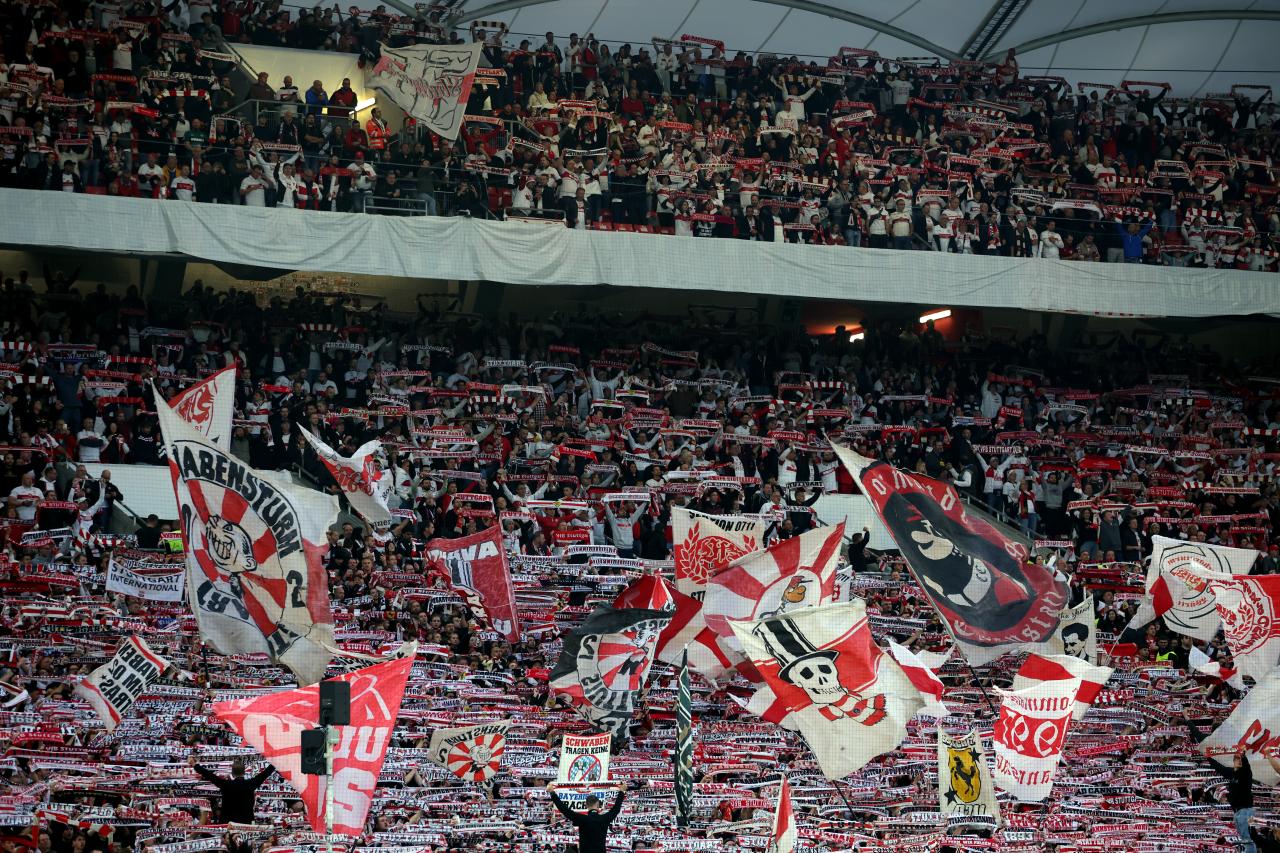

Recent Comments